Greek Plunder
Civvidy-doo.
- Joined
- Apr 10, 2004
- Messages
- 234
I wrote a fairly successful story awhile ago under the handle of werd hertz, and was
quite pleased with it. I've taken a long hiatus from Civ since then, and just recently picked up Conquests, and I've decided to give it another go. It should be fairly easy to follow. I like to role play a little, so some moves may not be the wisest in the long run, but the most entertaining in the short.
Civ: Byzantines (HOORAY!! Finally in Conquests!)
Map Size: Standard
Map Type: Pangea 70%, Random Terrain
Difficulty: Regent
4000 BC: Our first village has been settled; Constantinople. I have big plans, despite these humble beginnings, and can envision a city teeming with citizens and bustling with the activity of the day. Built along the coast, we will be able to take advantage of the fishing and travel ways the water can afford us. I see us making a strong living on the waves. The rocks are treacherous, and so we must be careful, less we lose the few good men we currently have. To the North-East is a tribe of what appear to be nomads, and we will send a troupe of emissaries to them once we've settled.
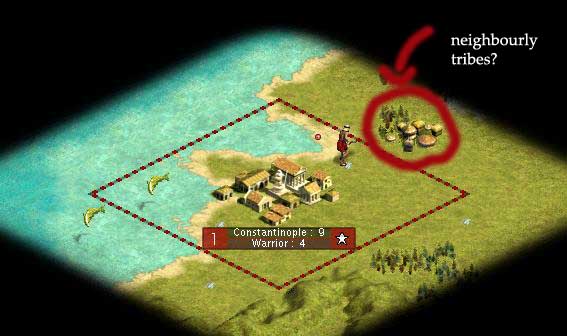
3500 BC: Steadily we grow, without interruption. Our village has expanded, with outlying farms becoming more common and plentiful. We have begun to mine the rich mineral out-croppings lying near by, and have begun to experiment with stone, in the hopes of constructing great monuments to represent our civilization. The nomads gave us their meager maps of the region and have since left, on their way to greener pastures, or so they said. The air is fresh by the sea, and my followers have finally given it a name. The Sea of Peoples. It will prove appropriate.
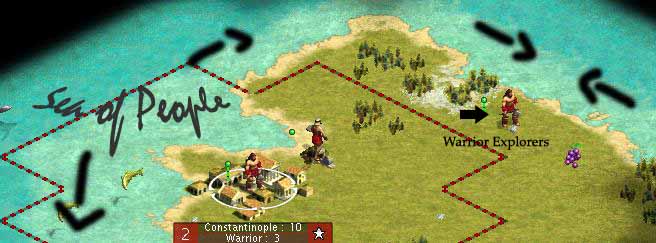
3400 BC: Our adventurous young warriors have tasted the sweet product of what they call grapes. They promise that, once old enough to leave the protection of their parents and the tribe, they will found a village there.
3200 BC: To the south lies a protective barrier of mountains, surrounding us like the loving arms of a mother. The Crest of the World, or so I have taken to calling it. It stretches from the Sea of Peoples in the west, all the way to the East. They ensure a good defensive position against marauding bands of raiders and possibly other, more hostile, civilizations, but they also promise an impediment, and will cause difficulty when we seek out new lands to settle. They appear rich in beautiful stones far to the East, along an unknown, and unnamed sea.

2900 BC: Weve sent out our first daughter colony, with them settling along the coast opposite Constantinople. Adrianople, as I have named her, is blessed as well with rich mineral deposits and spacious plains, along with yards and yards of cultivable grapes. We will grow these, and trade them amongst ourselves.
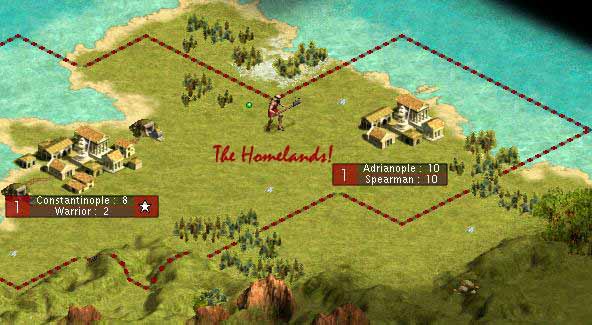
2850 BC: Our first battle took place on this date, with a group of our outward forces coming across a band of hostile Cimmerian barbarians. They fought valiantly, ultimately erasing all traces of this group of savages. They returned wounded, but experienced. This proves to ourselves that we are worthy of war, as well as sea travel.
2670 BC: I present to you the big picture, up to this point. We have encountered many barbarian tribes, nomads, friendly and hostile, although no civilized peoples like ourselves. It would be nice to see what other cultivated humans are capable of creating in this dangerous world. We have defeated forces of both Cimmerians and Thracians. So far we have expanded with one village, Adrianople, and are currently in the process of burgeoning the forces there with Spearmen, recruited from the populace and trained in defense. Weve trained many learned men in the mysteries of stone building, and I have now set these same men on the process of learning the Warrior Code, to understand how these hostile tribes fight and operate.
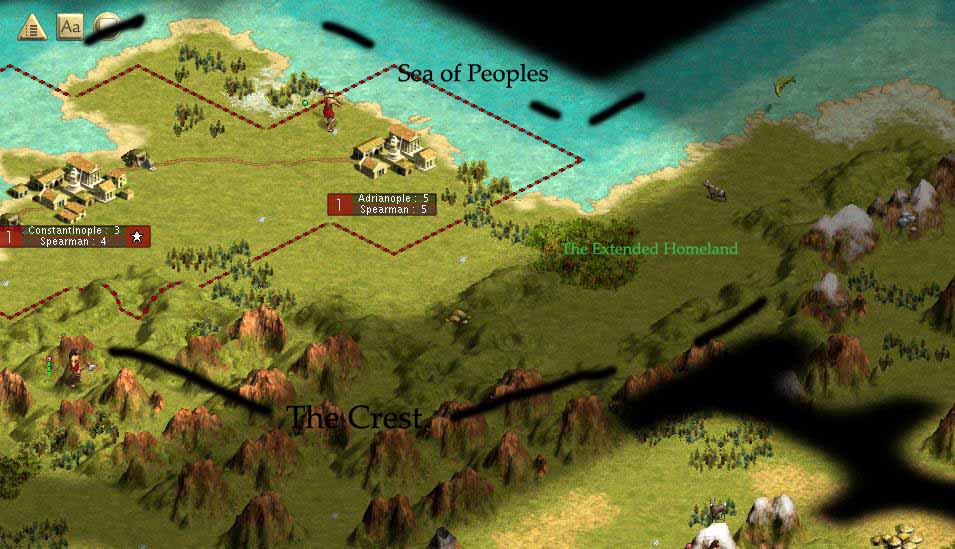
2430 BC: Life! Far to the south a small troupe of our most hardy warriors has come across a rustic village of peoples that have bestowed themselves with the name Greeks. They were found laying astride a fertile riverbed, and their leader, Alexander, was cautious to meet our acquaintance until after we spoke and traded. I gave him the secrets of masonry and a rudimentary amount of gold for the knowledge of the Wheel. This civilization seems quite advanced, but is far enough away as to not pose a security risk. We have become close friends, Alexander and I.
2431 BC: Near this same date, we came across the advanced Spanish to the East, distant from both my lands and my fellow Greeks. Their leader, Isabella, a most unattractive female, spoke cautiously while we traded our knowledge. Masonry for both a study on the Warrior Code and the mysticism of Ceremonial Burial. The Spanish are quite wise, although I do not think that Isabella fully trusts me the way Alexander does.
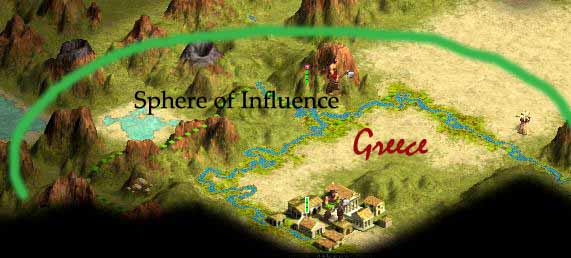
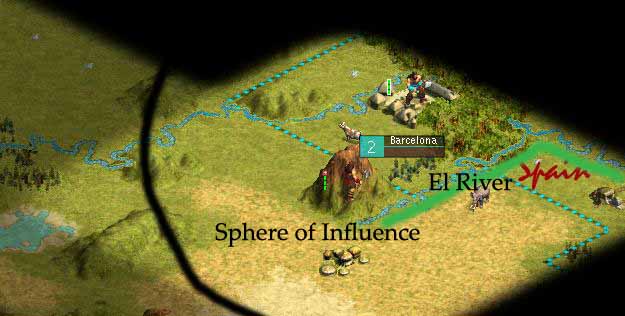
2350 BC: A friendly Mycenaean tribe has taught us the secret ways of Mysticism, while our warriors stumbled upon another pocket of hostile barbarians, this time the Gauls. The majority seem to be bent on the destruction of all settled, civilized, peoples. I dont bother with them though, and force my commanders to steer away once theyve been discovered. There is no sense fighting pointless battles.
quite pleased with it. I've taken a long hiatus from Civ since then, and just recently picked up Conquests, and I've decided to give it another go. It should be fairly easy to follow. I like to role play a little, so some moves may not be the wisest in the long run, but the most entertaining in the short.
Civ: Byzantines (HOORAY!! Finally in Conquests!)
Map Size: Standard
Map Type: Pangea 70%, Random Terrain
Difficulty: Regent
4000 BC: Our first village has been settled; Constantinople. I have big plans, despite these humble beginnings, and can envision a city teeming with citizens and bustling with the activity of the day. Built along the coast, we will be able to take advantage of the fishing and travel ways the water can afford us. I see us making a strong living on the waves. The rocks are treacherous, and so we must be careful, less we lose the few good men we currently have. To the North-East is a tribe of what appear to be nomads, and we will send a troupe of emissaries to them once we've settled.
3500 BC: Steadily we grow, without interruption. Our village has expanded, with outlying farms becoming more common and plentiful. We have begun to mine the rich mineral out-croppings lying near by, and have begun to experiment with stone, in the hopes of constructing great monuments to represent our civilization. The nomads gave us their meager maps of the region and have since left, on their way to greener pastures, or so they said. The air is fresh by the sea, and my followers have finally given it a name. The Sea of Peoples. It will prove appropriate.
3400 BC: Our adventurous young warriors have tasted the sweet product of what they call grapes. They promise that, once old enough to leave the protection of their parents and the tribe, they will found a village there.
3200 BC: To the south lies a protective barrier of mountains, surrounding us like the loving arms of a mother. The Crest of the World, or so I have taken to calling it. It stretches from the Sea of Peoples in the west, all the way to the East. They ensure a good defensive position against marauding bands of raiders and possibly other, more hostile, civilizations, but they also promise an impediment, and will cause difficulty when we seek out new lands to settle. They appear rich in beautiful stones far to the East, along an unknown, and unnamed sea.
2900 BC: Weve sent out our first daughter colony, with them settling along the coast opposite Constantinople. Adrianople, as I have named her, is blessed as well with rich mineral deposits and spacious plains, along with yards and yards of cultivable grapes. We will grow these, and trade them amongst ourselves.
2850 BC: Our first battle took place on this date, with a group of our outward forces coming across a band of hostile Cimmerian barbarians. They fought valiantly, ultimately erasing all traces of this group of savages. They returned wounded, but experienced. This proves to ourselves that we are worthy of war, as well as sea travel.
2670 BC: I present to you the big picture, up to this point. We have encountered many barbarian tribes, nomads, friendly and hostile, although no civilized peoples like ourselves. It would be nice to see what other cultivated humans are capable of creating in this dangerous world. We have defeated forces of both Cimmerians and Thracians. So far we have expanded with one village, Adrianople, and are currently in the process of burgeoning the forces there with Spearmen, recruited from the populace and trained in defense. Weve trained many learned men in the mysteries of stone building, and I have now set these same men on the process of learning the Warrior Code, to understand how these hostile tribes fight and operate.
2430 BC: Life! Far to the south a small troupe of our most hardy warriors has come across a rustic village of peoples that have bestowed themselves with the name Greeks. They were found laying astride a fertile riverbed, and their leader, Alexander, was cautious to meet our acquaintance until after we spoke and traded. I gave him the secrets of masonry and a rudimentary amount of gold for the knowledge of the Wheel. This civilization seems quite advanced, but is far enough away as to not pose a security risk. We have become close friends, Alexander and I.
2431 BC: Near this same date, we came across the advanced Spanish to the East, distant from both my lands and my fellow Greeks. Their leader, Isabella, a most unattractive female, spoke cautiously while we traded our knowledge. Masonry for both a study on the Warrior Code and the mysticism of Ceremonial Burial. The Spanish are quite wise, although I do not think that Isabella fully trusts me the way Alexander does.
2350 BC: A friendly Mycenaean tribe has taught us the secret ways of Mysticism, while our warriors stumbled upon another pocket of hostile barbarians, this time the Gauls. The majority seem to be bent on the destruction of all settled, civilized, peoples. I dont bother with them though, and force my commanders to steer away once theyve been discovered. There is no sense fighting pointless battles.

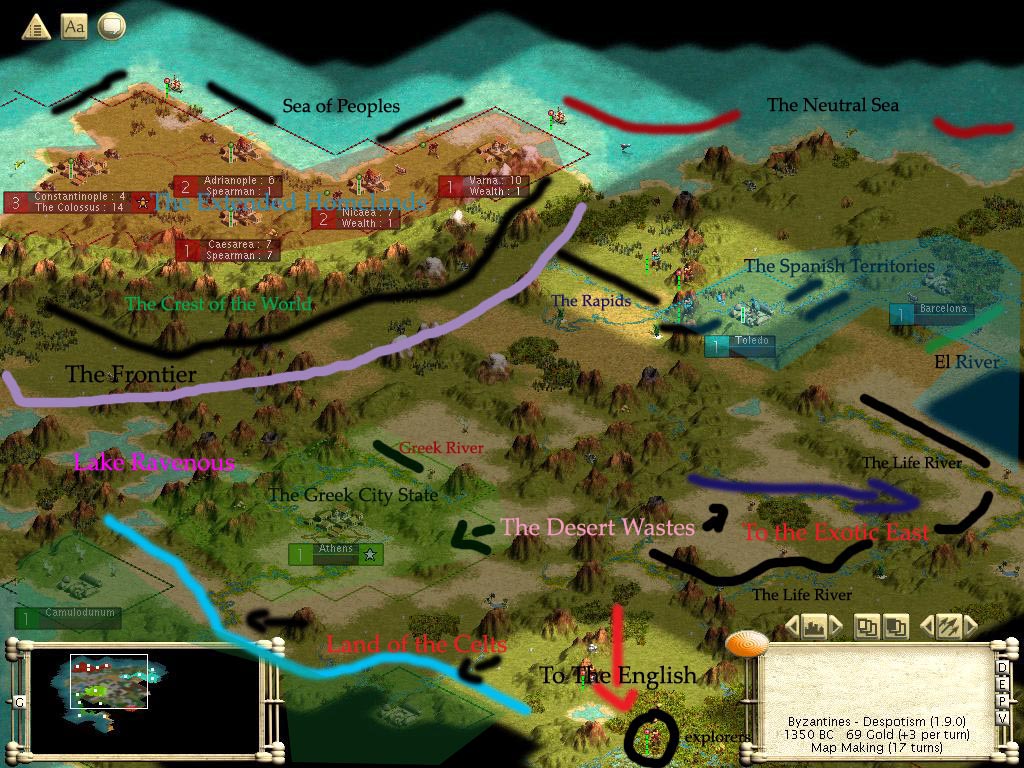
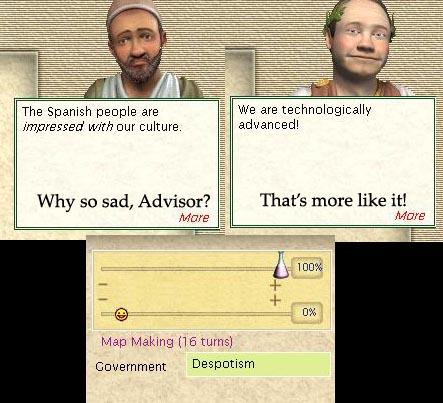

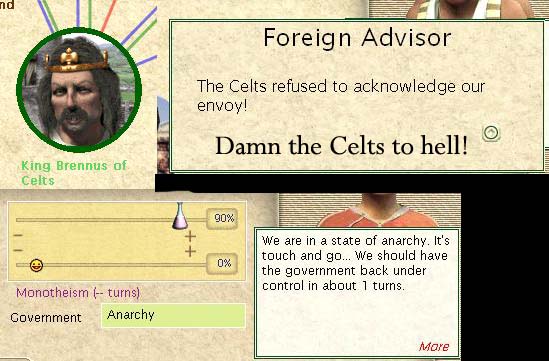
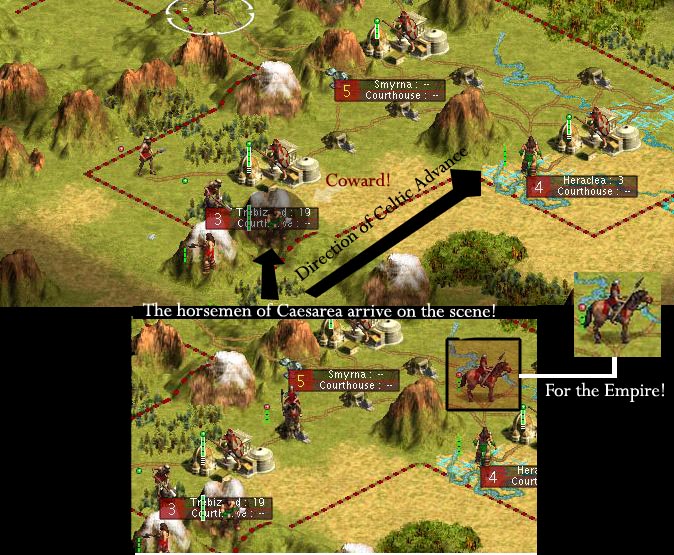
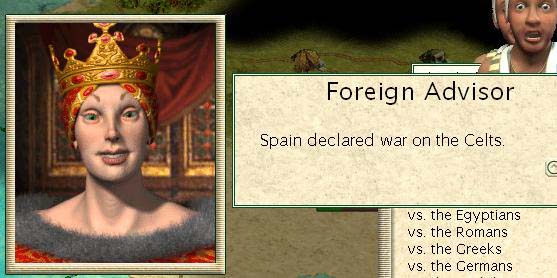
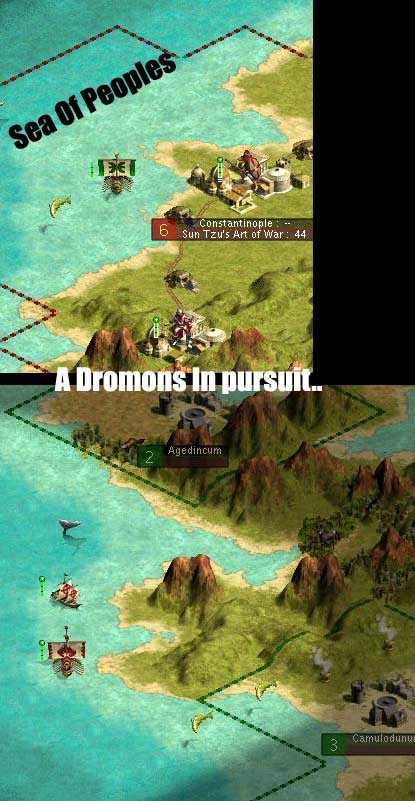
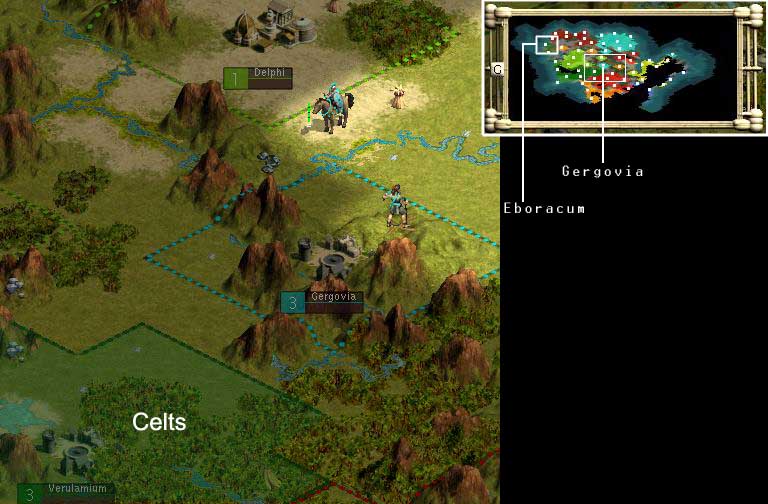
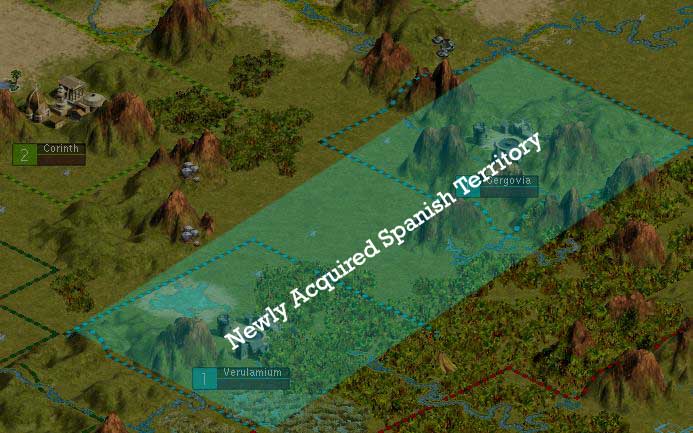
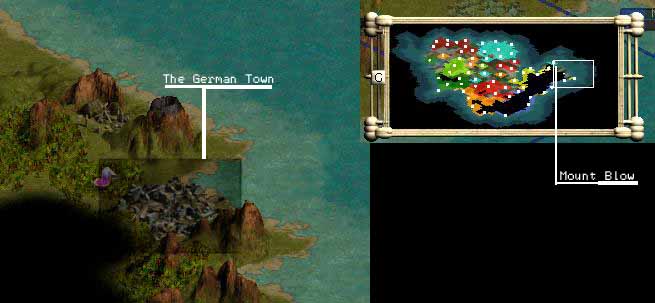

 ?
?